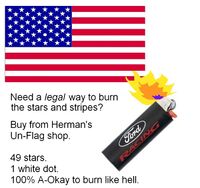Flag Burning Amendment

The Flag Burning Amendment, also known as the Flag Desecration Amendment — except that no one who is likely to burn the flag has a clue what "desecration" is — is a proposed amendment to the U.S. Constitution that your Senator religiously votes for, after negotiating in the cloakroom each time to make sure it fails by exactly one vote.
Why burn the flag?[edit]
Of all the methods of political protest, burning the American flag is by far the most effective. Especially if you are a maggot-infested hippie trying to change minds, burning a flag is an expression much more thoughtful than mere words. Given that your goal is to change the minds of the people most opposed to you — say, veterans of the armed forces — burning the symbol for which they gave up at least two or four years, and in some cases a limb or an eye, is an effective way of instantly changing minds.
Flag-burning is appropriate wherever you may be: in a crowded downtown, inside a government building, or even in thick woods. There is simply nothing that can go wrong.
Flag-burning is the designated method for disposing of worn-out flags. This is as opposed to, say, turning them into trousers, muscle shirts, or doo-rags. Boy Scouts learn this before becoming Tenderfoots, or tender feet, and often collect worn-out flags to start bonfires. They virtually never use the American flag as the neckerchief on their uniforms. Not even at Halloween.
Flag-burning, however, is frowned on when conveying an anti-American message. That is, it is all right to burn a flag when what you are feeling is reverence. It is not all right if you are feeling rage. This is why the most important aspect of being an American is to lie about what you are feeling, a trend that ushered in the presidency of Bill Clinton.
Flag-burning assumes that it's your flag. Burning a flag you don't own is never persuasive and is always trouble; likewise a barn, a home, or a joint.
Why pass a law?[edit]
Laws are passed by people in government, and no one gets into government to help people get along. They do it to get their way, and to slap down their opponents. People who don't want you to burn a flag want there to be a law against it. The famous comic strip, There Oughta Be a Law! was originally drawn as part of a campaign against flag-burning.
The problem, as always, is the damned First Amendment. Not only does it say you can't abridge free speech, it starts with "Congress shall pass no law...." Damned little wiggle room there. Free speech of course doesn't cover photos of bare breasts, or giving financial advice without registering with the S.E.C., rudely interrupting entertainment with a panicked stampede, wasting the time of emergency personnel, and providing a DNA sample, but whenever Congress tries to ban flag-burning, the Supreme Court slaps it down by a stinging 5-4 vote.
Why amend the Constitution?[edit]
When passing a law doesn't work — and no one wants to put a Supreme Court Justice out of work by impeachment — the best refuge of scoundrels is a Constitutional amendment. We won't tinker with the First Amendment; we'll just add some fine-sounding text that says exactly the opposite. The usual text is something like this:
| “ | The Congress shall have power to prohibit the physical desecration of the flag of the United States. | ” |
(Ya hear that, Beavis? He said "desecrate" again, heh heh heh!)
The beauty of a Constitutional amendment is that passage takes two-thirds of the House and of the Senate. In the case of the Senate, this means that 66 Senators with speaking engagements in front of the V.F.W. get to brag to the audience that they supported the amendment. There are 34 Senators whose only involvement with the military is to yell "baby-killer!" when they see returning servicemen at the airport. They will do the dirty work needed to kill the proposed amendment. In exchange, the 66 return the favor by voting 5% more money for the bureaucracy each year.
The 34 Senators don't even ask the others to vote for an amendment of theirs that likewise falls one vote short. Because they tend not to give a damn what the Constitution says at all.
If someone got the count wrong, the proposed amendment would still have to be approved by 38 of the states, where it could quietly be sabotaged. This is all part of the important work of government: Ensuring both that nothing changes, and that it's someone else's fault.



